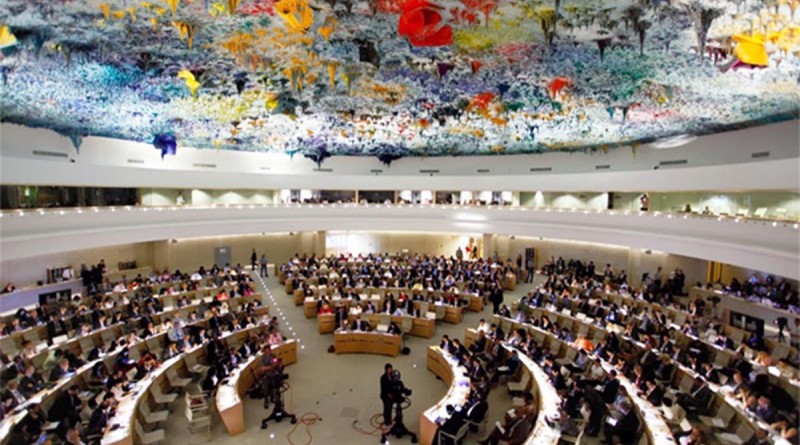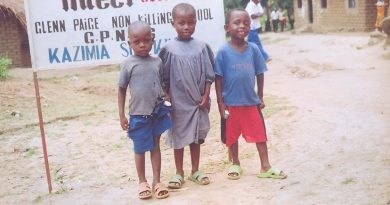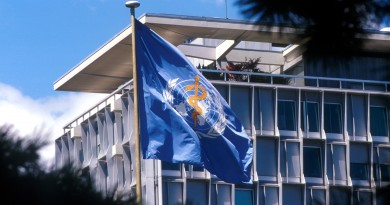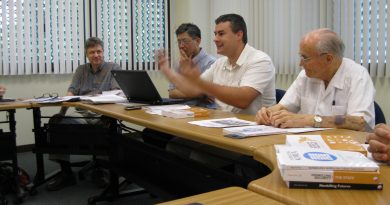Nonkilling country reviews underway at UN Human Rights Council—support needed!
All countries of the world, every four years and a half, undergo a peer to peer review of their human rights situation, their Universal Periodic Review (UPR). Three times a year, the Human Rights Council working group on the UPR meets to review 14 pre-selected countries. The country under review submits a report, the Office of the High Commissioner for Human Rights submits one too and NGO’s and other stakeholders make submissions that are summarized, by the office of the High commissioner, into a third report. During the working group session, the Country under review sends a delegation, usually a minister, and other countries make recommendations – on average around 150 of these – that the state under review can either accept or note (a diplomatic way to say that it refuses the recommendation). The advantage of the procedure, being peer to peer and voluntary, is that it avoids a lot of political criticism, leaving space for the concerned country to make commitments and to progress (or not) until it’s next passage 4 years later, when this progress is monitored again.
Now in its third cycle, all States of the world have participated in the UPR at least twice, thus recognizing the universality of human rights. The procedure is well in place and the issues covered are deepening and widening at a steady pace, thus improving the reach and the impact of human rights all over the planet. Surely, at the 70th anniversary of the Universal Declaration of Human Rights, much more remains to do. In many parts of the world and for so many people living in dire conditions, the work to improve their situation through human rights is only beginning. The UPR is nevertheless a solid ground for that type of work. All countries participate, thus recognizing that human rights exist and that their progress is an issue; a way or another, taking human rights in account is now unavoidable. NGOs clearly have their say, making it an inclusive process. From these legal, cultural and monitored proceedings, from this universal (all countries!) background, much more can and will be done. There will be setbacks and there may be countries that will not take the process seriously enough or where progress will be so slow it might not even be noticed. However the settings, including positive minds about it and –very importantly!– NGOs acting as watchdogs and making reports and suggestions will keep the betterment of life’s quality in focus, worldwide.
Not to say that addressing climate change and development for all is not equally as important as human rights; they are deeply interlinked. People aware of their rights and fulfilling them happily will be naturally and consciously prone, not only to hold all governments accountable for their legal human rights and climate duties and commitments, but also to see that we share the good of life upon all in a sustainable manner. Happy people breed a happy world. In this regard, the human rights work joins and links the works for peace and for the Sustainable Development Goals (SDG). With the SDG’s, for the first time, humanity has given itself a development plan made for all (the motto is “leave no one behind”), addressing all the major issues of our future, as individuals and people, as a species and as a civilization. Better, the progress of these goals is statistically measurable, and we need them for our survival.
CGNK is in Special Consultative Status with the UN Economic and Social Council since 2014 and Christophe Barbey has been its main representative in Geneva since 2015. Christophe’s link with CGNK started long ago, when Glenn Paige took note of Christophe’s studies on countries without armies. Christophe and Joám (CGNK’s director) then met in Santiago the Compostella in 2010 for the World Education Forum, where a human right to peace was also discussed. Christophe wrote a chapter on non-militarisation in CGNK’s book:”Nonkilling Security and the State”. He was then invited to participate in CGNK’s “Bio-Social Bases for Nonkilling and Nonviolent Behavior” week-long workshop organized at the Lorentz Center at Leiden University, The Netherlands, where he presented his work, but also the possibilities offered by the new procedure for human rights at the UN, the Universal Periodic Review, which he had already successfully used on some Swiss issues.
The work at the UN comes in time as all these aspects of life are being or should be discussed and as many of them are objectives for the Sustainable Development goals. Better and so far, the Centre for Global Nonkilling is the only NGO doing this type of wholesome work on the right to life and all its aspects.
Though other works have been carried on by CGNK at the UN, here we will focus exclusively on the Universal Periodic Review. CGNK and Mr. Christophe Barbey have so far used the UPR procedure to highlight problems and achievements regarding nonkilling and the right to life in 35 countries. We make two sorts of submissions, comprehensive and short ones.
Usually, a single comprehensive submission is made at every session of the UPR, looking at all the aspects of the right to life in one of the 14 countries under review. How is the local constitution promoting and supporting life and progressing towards nonkilling? Which international treaties protecting life (usually through human rights) still need to be ratified? And as Christophe comes from the peace work, how is the country faring regarding peace and how can peace be made more concrete therein as internationally? Similarly, which peace and disarmament, humanitarian law treaties still need ratifications?
Then a general overview of the situation of the right to life at the time of the submission in the chosen country is made. From reproductive rights through prenatal and genetic engineering, birth registration and access to a nationality (avoiding statelessness); birth, infant and maternal mortality; all causes of violent deaths including the ones caused by injuries, traffic, suicides and euthanasia… All these aspects of the right to life are needed to progress towards nonkilling societies. They can be life-saving and part of fulfilling the goal of avoiding all preventable deaths. These various dimensions of life cover a wide range of human activities and infrastructures that can often be measured, monitored and indeed improved.
Comprehensive submissions analyzing the situation of the right to life and advocating for nonkilling societies have been made (chronologically) for Nepal, Mozambique, Samoa, Iceland, the UK, South Korea, Switzerland, Botswana, Colombia, Eritrea, Mauritius and most recently for Costa Rica. Choosing which country we will do a submission for has been done on various criteria. Contact with local affiliates, NGO’s, scholars or activists is very important to ground our work in the field, to stimulate the use of the UPR worldwide and to promote the vision of nonkilling societies all over the world: this has been possible for Mozambique, Colombia and Eritrea. We here call upon and welcome the participation of all of CGNK’s affiliates and friends: please contact us if you want your country, the one you reside in or any country you care about to receive a comprehensive study of the right to life therein in the future.
Christophe has previous knowledge and diplomatic contacts with the countries who have no armies (who achieved total military disarmament), which explains their high presence in the list (Samoa, Iceland, Mauritius and Costa Rica) and as he is Swiss, he was happy to do a submission for his own country. Korea was chosen because of Glenn’s Paige and CGNK’s previous involvement there. The others were chosen on social, political and geographical criteria with the aim of maintaining diversity and impartiality.
While the right to life is often considered as a rather individual question, progressing towards nonkilling also requires the “big vision” and accurate action at a more general level. As the developing of UPR reporting became more systematic, CGNK also decided to expand our reach and visibility to more countries and to do short submissions, choosing at first one very special topic, a highly important one for the future of mankind, for the right to life and for the universality of the nonkilling ideal: the prevention of Genocide. The Convention on the prevention and the punishment of the crime of genocide is one day older than the Universal Declaration of Human Rights, both celebrating their 70th anniversary this year. The convention still needs ratification by 46 countries and as their turn comes up for the UPR, we will systematically make a submission to encourage them to ratify it. If other life protecting treaties need ratification in these countries or if the constitution does not sufficiently highlight the value and the quality of life, or if it allows for its breach too easily, including for or if there is the death penalty in the country, we will also mention it. So far such short submissions have been made for (in alphabetical order): Bangladesh, Bhutan, Brunei Darussalam, Cameroon, Central African Republic, Chad, Congo, Cook Islands, Djibouti, Dominica, Dominican Republic, Equatorial Guinea, Niue, North Korea, North Macedonia (Former Yugoslav Republic of), Qatar, Turkmenistan, Tuvalu and Vanuatu.
All the submissions until March 2018 are available here (sometimes with other docs such as texts and video links to oral statements at the Human Rights Council, presentations at UPR-info pre-sessions, etc.).
Success has been steadily growing. Quotations of CGNK’s demands in the OHCHR’s reports have steadily been rising in quantity and quality. Because of CGNK’s wide approach, new topics pertaining to life and peace come into the agenda of the Human Rights Council. Suicide prevention, a topic never addressed before in the Council was added, with the help of the delegation of Haiti and then others to demands to countries highly concerned about it. Thereafter, Nepal promised to stop criminalizing it and Switzerland admitted that suicide prevention is a State duty, as part of the protection of the right to life. Peace issues become of more concern and we insist, when addressing countries recovering from conflicts to do more for peace than just returning to normalcy. They need to create new and more solid grounds for peace and nonkilling practices to grow and last. As they use their resilience capacities, they have a formidable occasion to move ahead, to create and implement new peace and life preserving policies and eventually to become peace champion’s countries, instead of warring or conflicted ones. Highlighting peace as a human right, enhancing peaceful mechanisms, peace and nonkilling education, prevention of conflicts and violence, mediation (peaceful settlement of dispute in the national sphere as it is mandatory in the international sphere) and reporting on the progress of and towards peaceful and life enhancing societies; all these peace and life saving tools need to be enshrined in the fabric of society and ideally in the constitution of all countries. We also raised attention in various circles on the situation in the Indian State of Assam, where many people may become stateless, thus risking massive expelling or worse (as happened in Rakine State in Myanmar, starting the Rohingyas crisis). Finally, all the countries for which we asked so far the ratification of the genocide convention have accepted to do so. We will need to stay attuned to be sure they effectively do it. The fact the Center for Global Nonkilling has regularly been invited to present its submissions at the UPR-info pre-sessions, where diplomats and NGO’s informally meet to discuss possible recommendations, must also be noted.
A detailed report of the three first years (2015 -2017) of UPR work is available here.
The work will continue and success will grow as our network widens. However, we need help and support for it.
To improve the quality of the work, CGNK needs to develop a team of volunteers to build on our UN action.
Urgent work includes a focus on the death penalty; another topic that would require UPR submissions for every country where it still exists. Following the successes on the matter of genocide, CGNK also wishes to expand its work in alignment with the community of NGO’s and countries working on the abolition of the death penalty and to add our voice to those by doing systematic submissions, bringing a new and different comprehensive nonkilling perspective to all the countries still retaining it. We recall that it is the mission of the State to lead the example of respect for the right to life, as for all human rights, and not to the people to show the State what to do. On the death penalty, please watch this one minute video for the intervention of CGNK at the end:
Work also needs to be done on the criminalization of suicide. Suicides are preventable, yet many States instead of setting up help lines and other support mechanism, still make it a crime to attempt suicide. To change this through the UPR, we need to know who these countries are and henceforth to help them change their policies.
Last but not least, this work is costly.
Presently, the UPR work takes around 3 months a year. Volunteer work does now allow CGNK’s UPR reporting to be systematic and thorough as would be necessary to have a full impact. Funding to professionalize at least one part-time staff position in Geneva and to coordinate global monitoring volunteers is much needed. Meanwhile, small or big donations are greatly appreciated to cover basic costs and expensed. Thank you for supporting a nonkilling world!




